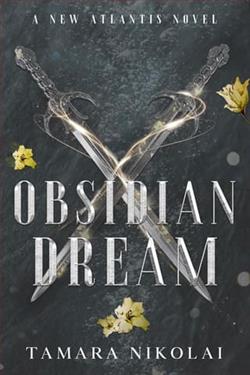Page 39 of The Last Stars in the Sky
“This looks promising,” she remarks.
“I thought my parents just used this for holding trash and stuff.”
“They used to keep some canned stuff in here,” Kerry remarks. “I remember bringing it out with my mom.”
Which reminds me, painfully, of how tied up she is with the cottage, almost as much as I am, albeit in a different way. It feels important to remember that.
“Yeah,” she says, nudging a stack of boxes filled with Mason jars. “Look.” I crouch down and see that it’s about a dozen large jars of spaghetti sauce. Kerry reaches down and slides one jar out of its slot in the box. “A bumper crop of tomatoes that year, I seem to remember,” she says, showing me the sticker on the front of the jar. In my mother’s careful, block-like writing, it readsMom’s SpecialSpaghetti Sauce 2001.
“Ew,” Mattie whispers. For some reason, we’ve all been talking in hushed voices, as if we’ve entered a crypt. “That’s over twenty years old. Can we still eat it?”
“I don’t know.” I glance at Kerry, and she shrugs.
“Why not?” She moves further into the root cellar. “What else is in here?”
We all start poking through the various barrels, buckets, and boxes; as I pry open the lid of an entire barrel of salt, I realize this stuff must be from the Y2K scare over twenty years ago, when my parents, in pioneer style, loaded up on all sorts of stuff in case the promised Armageddon arrived. Besides the salt, there are several lidded buckets of flour, another couple of sugar, and a box filled with about twenty packets of pasta.
“We’ve hit the jackpot,” Kerry states with satisfaction. She holds up a packet of what I realize are seeds. “Your parents really were preparing for the end of the world. We’ve got tomato, green bean, onion, peas, corn, and even seed potatoes, although, I’ll be honest with you, those are looking a little questionable.” Shemakes a face as she closes up a bag of what look like desiccated potato seedlings.
I look around at it all, feeling both heartened and discouraged, or maybe just overwhelmed. “Surely after twenty years,” I say slowly, “some of this stuff can’t be any good. The flour…”
She opens one of the buckets of flour and brandishes a small packet. “Oxygen absorbers, keeps the flour fresh, along with the gasket lid. Your dad really knew his stuff.”
I shake my head, reluctantly impressed. “How do you know about all this?”
“Are you kidding me? We were all preparing for Y2K up here. I think my mom was disappointed when nothing happened.” She drops the packet back in the bucket of flour and then seals the lid. “We should try to open it as little as possible, to keep it fresh.”
I put the lid back on the barrel of salt, and that’s when I notice the handwriting on the label on top. It’s my dad’s writing, spidery yet neat, so familiar and yet also forgotten.Salt, 20kgs. I trace the writing with my fingertips; it’s funny, how something so small can suddenly hit me straight in the heart, leave me breathless with missing him.
Kerry comes to stand beside me, glancing down at the barrel with its faded label. “He was one of the good ones,” she says quietly, and it occurs to me that she must have memories of my dad, memories I don’t have. I long to ask her about them, but I know now is not the time. The girls are here, and we need to work on our inventory. But along with that shaft of sorrow and grief, I feel something like solidarity. Kerry, of all people, understands a little of what I’m feeling.
I give her a fleeting smile, gesture to the girls, and step back out into the sunlight.
FOURTEEN
We have enough food, if we’re very careful, for about four or five months. It’s all there in front of me, in Ruby’s laborious writing, painstakingly neat, a column of figures that in probably any other circumstances would be impressive. Certainly enough to withstand a blizzard, or even a siege. But when I broke it down, trying to think practically, it didn’t actually end up feeling like very much. Worse, it didn’t feel like enough.
Two packets of pasta, with two jars of sauce, will provide a week of dinners; we have enough of both for ten weeks. The flour, if it really is still usable, will make two loaves of bread a week for twelve weeks; we don’t have any yeast but, according to Kerry, you can make it yourself, not that I know how. I’m not sure she does, either, but maybe we can figure it out. Together.
For breakfast, half a cup of oatmeal each, made with water, should last around the same amount of time. The turkey, if I eke it out, will last a couple of weeks, along with the eggs; all the fresh fruit and veg, along with the milk, will, of course, last only a week or two, if that, before it spoils. Juice, butter, and cheese, a bit longer. The frozen dinners and pizzas might add, at best, another couple of weeks to our total, as long as we don’t have a thaw, but basically, best-case scenario, we’re looking atrunning out of food in April or May, and that’s not considering the vitamin and nutrient deficiencies we might be experiencing before then, without any fresh fruit or vegetables, meat or protein.
I asked Kerry when the chickens might start laying eggs again, and she said maybe in March, and that’s only of course if they survive the winter.
“Regretting asking us here?” she asked sardonically, correctly reading the expression on my face, and I sighed.
“Look, I admit that I asked you here, at least in part, because of how you might be able to help. Wouldn’t you have been the same?”
She was silent for a moment before she admitted slowly, “Yeah, I would have.”
It felt like a truce, a ceasefire. That was the last time she made one of those remarks, gave me one of those knowing, smirking looks, which has been something of a relief.
Now I sit and stare out at the dark night as the fire burns low, and the cottage settles quietly all around me. It’s eleven o’clock at night and everyone is in bed, hopefully asleep. I’m grateful for the moment’s peace because while the future yawns emptily in front me, the days have felt distressingly full.
I glance down again at the list of food.Enough till April.
We can’t start planting till May and, even then, whatever we plant, we wouldn’t be able to start harvesting until July…and that’s assuming we can actually live off what we plant, which I’m not at all sure about. I have never actually gardened before, besides planting some begonias in pots, although I watched my mom when I was little. She was always happy in the garden, knees right down in the soil, hands covered in earth.
I reach for my wine glass and take a sip; Daniel and I bought a case of wine at the LCBO in Kingston on the way up, and while I know it’s precious, I felt like I needed a drink tonight. I needthe edges of everything to soften, just a little, for just a little while. I also need to think.















